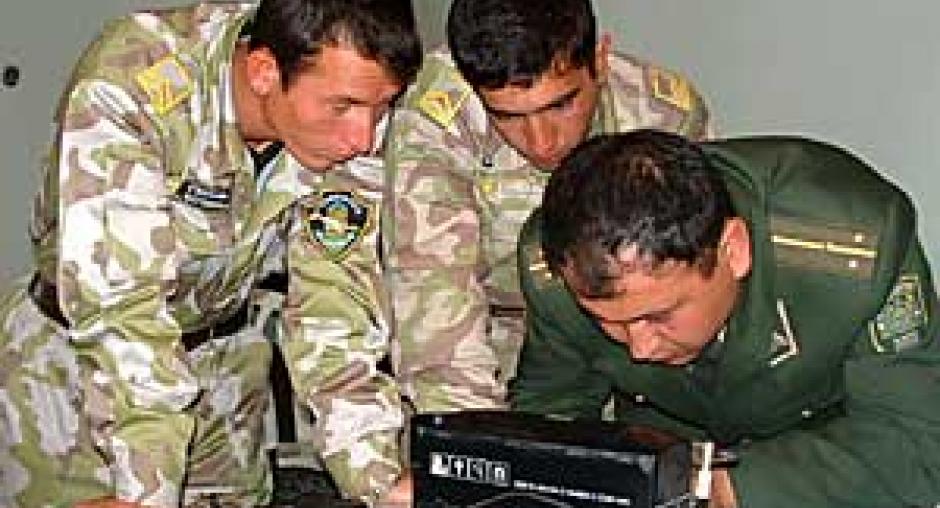Newsroom
Uzbek and Afghan officials to attend OSCE border control training
TASHKENT 17 October 2003

(OSCE/Helmut Gram)Uzbek border guards and customs officials at an OSCE training course at the Uzbek-Tajik border, October 2003. (OSCE/Helmut Gram) Photo details
TASHKENT, 17 October 2003 - Border guards, police officers and customs officials from Uzbekistan and Afghanistan will attend a two-week OSCE training course, which will start in the Uzbek border town of Termez next week.
Officials from the Uzbek and the Afghan sides of the border-crossing point between Termez and Hayraton, as well as from the Afghan capital, Kabul, are participating in the training programme from 20 until 31 October.
The main goal of the project is to promote internal co-operation between Uzbek border, customs and police authorities, as well as that between Afghan and Uzbek officials. This will enhance the capacity of both countries' border guards and customs officials to interdict illegal arms shipments.
Training modules will include risk assessment and profiling, assessing body language, identifying forgery, and modern techniques of detecting and seizing illicit weapons.
The border guard training programme, organized jointly by the OSCE Secretariat's Conflict Prevention Centre and the OSCE Centre in Tashkent, is a follow-up to the 2002 project - Combating Trafficking of Small Arms and Light Weapons (SALW) through Border Management Assistance.
That project involved an initial training course, jointly organized in Termez in November by the OSCE and the UN, which was aimed at assisting Uzbekistan to re-establish cross-border movement and enhancing the country's capacity to respond to the trafficking of SALW.
Afghanistan, which has a 137 km-long border with Uzbekistan, became an OSCE Partner for Co-operation in April this year, and this is the first time it has taken part in an OSCE activity.
Officials from the Uzbek and the Afghan sides of the border-crossing point between Termez and Hayraton, as well as from the Afghan capital, Kabul, are participating in the training programme from 20 until 31 October.
The main goal of the project is to promote internal co-operation between Uzbek border, customs and police authorities, as well as that between Afghan and Uzbek officials. This will enhance the capacity of both countries' border guards and customs officials to interdict illegal arms shipments.
Training modules will include risk assessment and profiling, assessing body language, identifying forgery, and modern techniques of detecting and seizing illicit weapons.
The border guard training programme, organized jointly by the OSCE Secretariat's Conflict Prevention Centre and the OSCE Centre in Tashkent, is a follow-up to the 2002 project - Combating Trafficking of Small Arms and Light Weapons (SALW) through Border Management Assistance.
That project involved an initial training course, jointly organized in Termez in November by the OSCE and the UN, which was aimed at assisting Uzbekistan to re-establish cross-border movement and enhancing the country's capacity to respond to the trafficking of SALW.
Afghanistan, which has a 137 km-long border with Uzbekistan, became an OSCE Partner for Co-operation in April this year, and this is the first time it has taken part in an OSCE activity.
